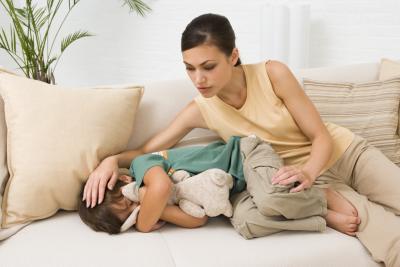Juvenile rheumatoid arthritis is a form of arthritis found in children 15 and younger. This autoimmune disease affects around 50,000 children each year in the United States, according to KidsHealth. The duration and severity of the symptoms, which are most often seen in the joints, vary widely in children, from rather mild to quite serious.
Joint Pain
Joint pain is one of the most common symptoms of juvenile rheumatoid arthritis, according to MayoClinic.com. Pauciarticular (or oligoarthritis) arthritis affects four or fewer of the large joints, causing pain in the knees, elbows and ankles. Children affected by this type of juvenile rheumatoid arthritis may find walking painful, especially in the mornings, and may limp or move slowly. Polyarticular affects five or more joints, usually smaller joints, causing pain in the fingers, wrists and feet. This type affects more girls than boys.
Swollen, Stiff Joints
Along with pain, the joints may be swollen and stiff as well, especially after a nap or in the morning. The joints may even be warm to the touch, according to the Robert Wood Johnson University Hospital website. Children who are affected may shy away from doing things that require large or fine motor skills, such as running, or even writing. Often, these children appear clumsy.
Fever and Rash
Children who suffer from systematic juvenile rheumatoid arthritis may develop fevers and rashes on the skin, especially on the chest. This type of arthritis affects about 20 percent of children with juvenile rheumatoid arthritis, according to the University of Iowa Hospitals and Clinics. Some of the body’s systems, such as the liver and lymph nodes, can become swollen and irritated. This inflammation causes a fever. Joint pain may occur as well.
Inflamed Eyes
Eye inflammation can occur in juvenile rheumatoid arthritis, which is why eye care is important for children who are affected with the disease. In severe cases, cataracts or blindness can result, according to MayoClinic.com, if the inflammation is left untreated.
Poor Bone Growth
Juvenile rheumatoid arthritis can slow bone growth, or cause bones to grow incorrectly. Often, children with this disease are smaller than average for their ages.





